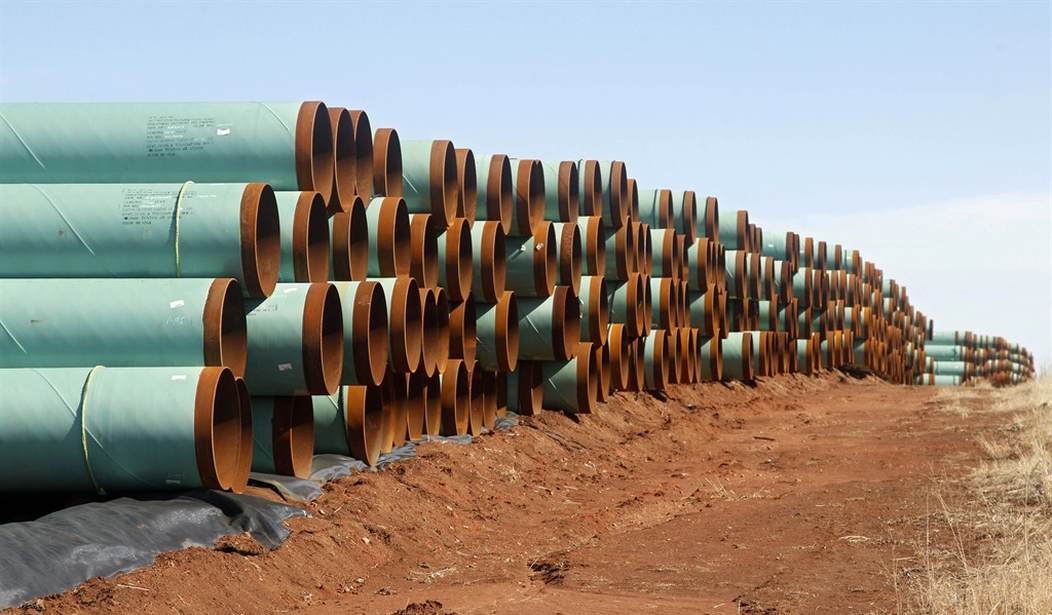In one of President Joe Biden's first official acts, he took action to cancel the Keystone XL pipeline project. It was one of the opening shots in his now nearly two-year war on American energy, and we're now finally hearing from the Biden administration itself just how much money that decision cost and how many good-paying American jobs it killed.
The cost information now coming to light was released — quietly, of course — in December by the Department of Energy after an act of Congress required a report from DOE with information on the "job losses and consumer impacts associated with the revocation of the Keystone XL (KXL) pipeline permit" as part of the Infrastructure Investment and Jobs Act.
That law stated that DOE, under the leadership of Secretary Jennifer Granholm, was to:
(1) conduct a study to estimate—
(A) the total number of jobs that were lost as a direct or indirect result of section 6 of Executive Order [13990] over the 10-year period beginning on the date on which the Executive Order was issued; and
(B) the impact on consumer energy costs that are projected to result as a direct or indirect result of section 6 of the Executive Order over the 10-year period beginning on the date on which the Executive Order was issued; and
(2) not later than 90 days after the date of enactment of this Act, submit to Congress a report describing the findings of the study conducted under paragraph (1).
Well, Granholm and her department missed the deadline, but this is a better late than never situation.
As the Biden administration admitted, finally, the Keystone XL project would have provided for at least 50 permanent operations jobs, but the main source of employment would have come from the construction of the pipeline — that is, union jobs — and secondary employment to support those working on the pipeline.
Recommended
The Department of Energy's report conclusion explains that "estimates for the jobs created during the construction phase of the KXL pipeline ranged from 16,149 to 59,468 annually for a two-year period," positions that never came to fruition as a result of Biden's executive order revoking the project's permits.
DOE's report also cited a 2014 "Final Supplemental Environmental Impact Statement" (SEIS) completed by the State Department — under the Obama administration — which found that "about 42,100 total jobs, or 21,050 jobs annually, would be created if construction were to take two years."
What's more, the Obama State Department's SEIS estimated "$2.05 billion in earnings in the United States" if the pipeline project was completed and "contribute $3.4 Billion (or 0.02 percent) to the United States Gross Domestic Product."
That's economic activity that Biden snuffed out via executive fiat in his war to "end fossil fuels," a campaign that's not only penalized the United States economy but also made it more difficult for Americans to make ends meet while still keeping their cars running and homes warm.
Perhaps conveniently, DOE found that "the effect" on consumer prices of Biden canceling the Keystone XL project "was inconclusive," citing "changes that have occurred in Canadian and U.S. crude oil markets since the KXL pipeline was proposed."
In a video released this week by Power the Future, energy workers — the likes of which had job opportunities taken from them by Biden's executive order killing Keystone XL — explain what his war on oil and gas means to them and their families:
The White House has admitted what we’ve said for years: the decision to kill the #KeystoneXL pipeline hurt people and our economy.
— Power The Future (@powerthefuture) January 6, 2023
While Joe Biden often talks about creating ‘good union jobs’, it’s clear he'll always put politics before people.
More: https://t.co/sqF1GIjpDW pic.twitter.com/a8YD4Md0RC

























Join the conversation as a VIP Member